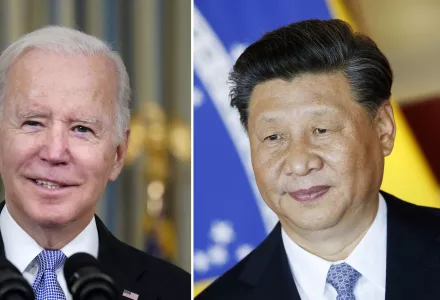
Download the Full Paper
The Great Diplomatic Rivalry: China vs the U.S. (PDF)
Executive Summary
The confrontation in Anchorage between China’s top diplomats Yang Jiechi and Foreign Minister Wang Yi, and the American tag team of Secretary of State Antony Blinken and National Security Adviser Jake Sullivan essentially said it all.1 (For those whose memories of the event have faded, it is worth the five-minute detour to watch this clip.) The days when Chinese officials would sit politely listening to lectures from their American counterparts about their country’s faults are over. China’s patience for instructions from Americans about how China should change its behavior to win the approval of the international community has been exhausted. From now on, as Yang put it pointedly: “The United States does not have the qualification…to speak to China from a position of strength.”2 To the contrary, as Foreign Minister Wang has repeatedly said: China will now engage the U.S. standing on “equal footing”: eyeball to eyeball, without apologies—determined to land as many blows as it takes.
It was not that long ago that Chinese statecraft was guided by Deng Xiaoping’s injunction to “hide and bide”: keep a “low profile” and “never claim leadership.” Then, Foreign Ministry officials were essentially interpreters, referred to by colleagues in the Chinese government as “barbarian handlers.”3 Their assignment was to talk to foreign officials in their own language and communicate that they understood their concerns—but make as few concessions as possible. China’s goal was to ensure a permissive external environment in which it could pursue its principal agenda at home: stability and economic growth.4 And in large part, it succeeded. (In retrospect, it’s instructive to consider why so few Americans paused to ask: hide what, why? Or bide until when, to do what then?)
But that was then. Today’s Chinese diplomats draw from a new playbook. In large part this reflects how reality has shifted, illustrated vividly in Anchorage.
Diplomacy has become a critical component of the “great rivalry” between China and the U.S.—one that will continue to intensify in the months and years ahead.
The contours of this great rivalry are shaped by the statements and rhetoric each side uses to craft a narrative about the other. According to Washington, China is the dominant threat not just to the U.S. but to the world. According to the Biden Administration’s talking points, it is the “only country with the economic, diplomatic, military, and technological power to seriously challenge the stable and open international system.”5 By erecting protectionist barriers to handicap foreign companies in Chinese markets, subsidizing Chinese champions, and directing its security services to steal intellectual property for its advanced technology companies, China is undermining the global rules-based economic order. By constructing and militarizing illegal islands in the South China Sea, sailing its ships into other nations’ territorial waters, flying planes into their air space, conducting persistent cyberattacks on foreign companies and governments, and even provoking kinetic clashes—such as the dramatic incident in which Chinese killed 20 Indian soldiers along the disputed Sino-Indian border—China is escalating the risks of war.6 By denying its citizens their basic human rights, crushing democracy in Hong Kong, and pursuing a genocidal policy against Uyghurs in Xinjiang, China’s autocracy is threatening democracies everywhere.
After an initial period in which Chinese diplomats largely played defense, denying American charges, they have now moved to play offense as well. According to their narrative, the biggest threat to global peace and security is the USA. According to Wang and Yang, U.S. rhetoric about a “rules based international order” is a conjurer’s trick. Ignoring the order established by the great powers when they created the United Nations (UN) in 1945, the U.S. is seeking to replace it with a new “liberal rules-based order” in which the U.S. writes the rules and others obey its orders. In that order, the U.S. serves as judge, jury, and executioner. Chinese point to the U.S.-led NATO bombing of Serbia in 1999 to force the government to allow Kosovo to secede as a vivid case in point. (This resonates for Chinese who have never accepted U.S. assurances that the bombing of China’s embassy in Belgrade during these attacks was accidental.) As Yang put it, China champions “the United Nations-centered international system and the international order underpinned by international law, not what is advocated by a small number of countries of the so-called rules-based international order.”7
Contrary to U.S. claims about China’s flagrant disrespect for the views of the international community, Chinese diplomats argue that the U.S. is the one out of step with the majority of mankind. Who elected the U.S. as spokesman for the world, they ask. In fact, America speaks for a small minority of the 7.9 billion people on the Earth, roughly one fifth of whom are Chinese. In Yang’s words, whether “judged by population scale” or the “trend of the world,” the United States “does not represent international public opinion.”8 Before criticizing others, he and Wang suggest Americans should look at their own problems: their human rights abuses and systemic racism, their dysfunctional democracy that saw their Capitol attacked by their own citizens, their military’s cyberattacks on other nations. In essence, they say Americans should read carefully what America’s clearest-eyed critics are saying about their own country.
According to Beijing, the principal cause of “war, chaos, turbulence and numerous tragedies” over the past two decades has been U.S. military aggression. During these decades, China claims it has “never threatened to use military force
against other countries, never engaged in military alliance, and never exported ideology.”9 In contrast, as Chinese Ambassador to the U.S. Qin Gang described, China “is committed to peaceful, open, cooperative and common development, and works to build a community with a shared future for mankind.”10
Indeed, Chinese diplomats ask: who poses the greatest threat to global governance? Highlighting the United States’ unilateralist tendencies in the past two decades, China argues that no one has undermined the major international institutions including the World Trade Organization (WTO), the World Health Organization (WHO), and the UN as consistently as the U.S. Noting that these organizations were originally designed with the interests of only “a small number of people” in mind, China is working with others to promote their “reform and improvement” to ensure, as Xi Jinping said at the 2021 Boao Forum, that there will be no more “bossing others around.”11 In reporting on Xi’s speech at the Forum, the Chinese state news agency Xinhua summed up the bottom line: “Facing a world with growing anti-globalization sentiment, populism, unilateralism, and protectionism,” China has arrived at center stage—and is more prepared than ever to pursue “its own vision of global governance.”12
From our review of the diplomatic record of China and the U.S. over the first two decades of this century, we report a number of troubling trendlines. Given where China started at the beginning of the century, it is not surprising that in playing catch-up it has closed the gaps with the U.S. in many arenas. Confronting these facts, especially when they are uncomfortable, is an essential prerequisite to asking what should be done. To begin with our bottom lines up front:
- In a phrase: game on. The era of “hide and bide” is over. China is now determined to compete as aggressively in bilateral and multilateral diplomacy as it does in other arenas.
- For Washington, diplomacy has become a “lost art.” This is a damning charge. But it comes from one of America’s most distinguished diplomats. Currently the Director of the CIA, Bill Burns began as a foreign service officer and rose through the ranks to serve as Obama’s Deputy Secretary of State.13 Reviewing what has happened over the past three decades, his bottom line is that Washington has lost this essential art.
- The good news is that China has not yet found it. At the end of the Cold War, many in Washington believed that the world had entered a new unipolar era in which Americans could essentially dictate to others what they “must” do.14 During the previous administration, as President Trump boasted about America First and bullied allies and adversaries alike, Chinese diplomats could succeed by simply letting Trump undermine
- U.S. alliances, or by offering easy rejoinders like Xi’s “shared future for mankind.” Nonetheless, where Chinese diplomats have tried to play offense, former Australian prime minister Kevin Rudd notes, “China’s standing has taken a huge hit.” In Rudd’s words, “the irony is that these wolf warriors are adding to this damage, not ameliorating it.”15 After months of what professional diplomats would call malpractice, Xi Jinping has recognized the problem and issued new instructions to the Foreign Ministry. But his recent directive to his diplomats “to create a credible, lovable and respectable image of China” reminds us that Chinese diplomacy remains a work in progress.16
- The current CCP regime’s founding diplomat, Zhou Enlai, defined diplomacy as the “continuation of war by other means.” The acid test is thus how successful a state’s diplomacy is in getting other states to do what its leaders want.17 There, China’s performance has, until recently, earned higher marks than America’s. In large part, this reflects the fact that Chinese leaders’ assignments to their diplomats were more achievable. Until the Xi era, at the level of grand statecraft, China sought “breathing space” to allow it to build its economic power at home and abroad. In contrast, during the same two decades, U.S. foreign policy was, as former Secretary of Defense Robert Gates argued conclusively in his book Exercise of Power, “overmilitarized.” Symbolically, China’s entry into the WTO in 2001 and conclusion of the two decades with the signing of comprehensive trade and investment treaties with the majoreconomies of Asia and Europe in 2020 provide instructive bookends. The U.S. analogues are two decades that began with the dispatch of hundreds of thousands of troops to Iraq and Afghanistan after the terrorist attack in 2001, and ended in 2021 with the final withdrawal of all combat forces from a losing venture in Afghanistan.
- On the other hand, statecraft also requires execution. At the level of implementation, Chinese diplomats’ ferociousness has become a liability. For example, just three months after China and the EU signed their landmark investment treaty, the deal came to a grinding halt: China responded to EU human rights sanctions by imposing counter-sanctions on five EU parliamentarians, thereby allowing opponents of the deal to persuade Parliament to pause its review of the deal. As Joerg Wuttke, head of the European Chamber of Commerce in China, put it, “We had seven years of negotiations for the deal. Now it looks like it will take another seven years.”18
- For a generation, Washington has largely dissed diplomacy: denigrating its significance, disinvesting in its professionals, demeaning the role of continuous conversation and artful persuasion. As Nick Burns, the nominee who waited nine months to be confirmed as U.S. Ambassador to China, concluded in a Harvard report finished before his nomination in which he proposed a renewed “Diplomatic Service for the 21st century”: “The Foreign Service...is facing one of the most profound crises in its long and proud history.”19 President Trump’s visceral allergy to diplomacy, especially in dealing with American allies like German Chancellor Angela Merkel, became legendary. But it was the president who preceded him who asked disparagingly: who needs George Kennan now?20
- On most metrics of diplomacy, China’s position relative to that of the U.S. has risen dramatically over the past two decades. In hosting summits, one-on-one meetings with heads of state, face-to-face meetings of key cabinet officers in China and other nations’ capitols, numbers of embassies and consulates, numbers of diplomats serving internationally, representation in international organizations, foreign affairs spending, diplomatic training, and positions of leadership in international organizations, China has made great leaps forward.
Allison, Graham, Alyssa Resar and Karina Barbesino. “The Great Diplomatic Rivalry: China vs the U.S..” Belfer Center for Science and International Affairs, Harvard Kennedy School, August 2022
- As a member of the Politburo, Yang Jiechi outranks Foreign Minister Wang Yi.
- “How it happened: Transcript of the US-China opening remarks in Alaska,” Nikkei Asian Review, March 19, 2021, https://asia.nikkei.com/Politics/International-relations/US-China-tensions/How-it-happened-Transcript-of-the-US- China-opening-remarks-in-Alaska.
- William Choong, “Beware China’s ‘Barbarian Handlers,’” The Diplomat, February 11, 2020, https://thediplomat.com/2020/02/beware-chinas-barbarian-handlers/.
- See: Graham Allison and Fred Hu, “An Unsentimental China Policy,” Foreign Affairs, February 18, 2021, https://www.foreignaffairs.com/articles/united-states/2021-02-18/unsentimental-china-policy. Prior to China’s shift in focus towards economic development, it was heavily engaged in supporting communist revolutions abroad.
- Antony Blinken, “The Administration’s Approach to the People’s Republic of China,” The White House, May 26, 2022, https://www.state.gov/the-administrations-approach-to-the-peoples-republic-of-china/.
- Steven Lee Myers, “China Acknowledges 4 Deaths in Last Year’s Border Clash With India,” New York Times, March 1, 2021, https://www.nytimes.com/2021/02/19/world/asia/china-india-clash.html.
- “How it happened: Transcript of the US-China opening remarks in Alaska.”
- Ibid.
- “Foreign Ministry Spokesperson Wang Wenbin’s Regular Press Conference on April 29, 2021,” Ministry of Foreign Affairs of the People’s Republic of China, press release, April 29, 2021, https://www.fmprc.gov.cn/mfa_eng/xwfw_665399/s2510_665401/t1872574.shtml.
- Larry Luxner, “Chinese Ambassador Qin Gang addresses strained bilateral ties,” The Washington Diplomat, September 27, 2021, https://washdiplomat.com/chinese-ambassador-qin-gang-addresses-strained-bilateral-ties/.
- “Full Text: Keynote speech by President Xi at Boao Forum for Asia Annual Conference 2021,” Xinhua, April 20, 2021, http://www.chinadaily.com.cn/a/202104/20/WS607e62d4a31024ad0bab6ba7.html.
- “Xi Focus: Xi’s answer to “questions of our time” reverberates beyond Boao,” Xinhua, April 18, 2021, http://www.xinhuanet.com/english/2021-04/18/c_139889038.htm.
- William J. Burns, “The Lost Art of American Diplomacy,” Foreign Affairs, May/June 2019, https://www.foreignaffairs.com/articles/2019-03-27/lost-art-american-diplomacy.
- For a discussion on “must” rhetoric, see Douglas J. Feith, “Must-y Cairo Rhetoric,” Hudson Institute, June 11, 2009, https://www.hudson.org/research/6294-must-y-cairo-rhetoric.
- Kevin Rudd, “The Coming Post-COVID Anarchy,” Foreign Affairs, May 6, 2020, https://www.foreignaffairs.com/articles/united-states/2020-05-06/coming-post-covid-anarchy.
- Steven Lee Myers and Keith Bradsher, “China’s Leader Wants a ‘Lovable’ Country. That Doesn’t Mean He’s Making Nice,” New York Times, June 8, 2021, https://www.nytimes.com/2021/06/08/world/asia/china-diplomacy.html.
- Charles W. Freeman, The Diplomat’s Dictionary, 2nd ed (Washington, D.C: United States Institute of Peace, 2010).
- Tom Mitchell, “China’s ‘wolf warriors’ refuse to back down,” Financial Times, April 10, 2021, https://www.ft.com/content/e4a00ea4-d198-41f1-a527-65f18865a534.
- Nicholas Burns, Marc Grossman, and Marcie Ries, “A U.S. Diplomatic Service for the 21st Century,” (Belfer Center for Science and International Affairs, November 2020), 3.
- In an interview with The New Yorker, President Obama said, “I don’t really even need George Kennan right now.” See David Remnick, “Going the Distance,” New Yorker, January 19, 2014, https://www.newyorker.com/ magazine/2014/01/27/going-the-distance-david-remnick.






